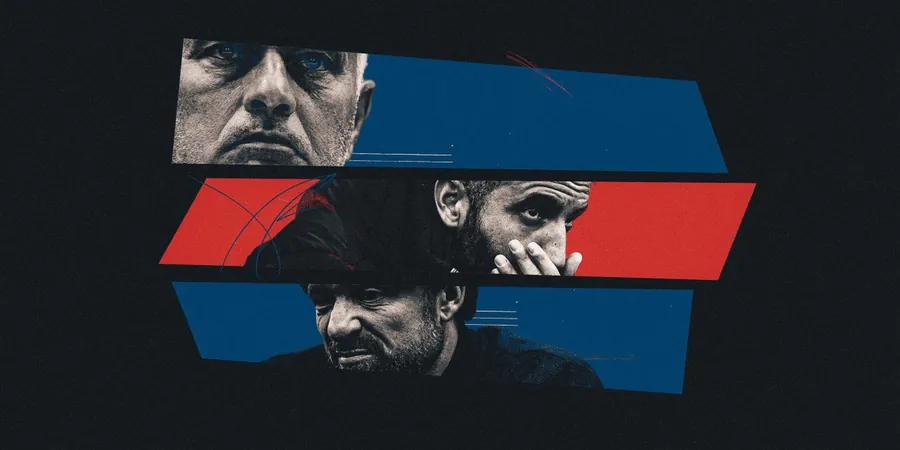
The Coaches Who Stand Firm: A Battle Between Ideas and Results
2025-09-18
Author: Nur
Jose Mourinho has once again stirred the pot, this time with a sharp critique of football coaches who cling to rigid philosophies at the expense of results. In a candid interview, Mourinho declared, “If you die by your ideas, you are stupid.” His words serve as a haunting reminder of the modern game’s obsession with concepts over concrete outcomes.
As Mourinho contemplates a potential return to management with Benfica, his comments resonate in the current climate where many coaches prioritize their idea over victory. He highlights a stark division between those he calls 'pragmatists'—coaches willing to adjust for success—and 'poets,' who remain steadfast to their strategies, regardless of poor performance.
Mourinho's remarks bring to light a trend exemplified by figures like Ruben Amorim, current manager of Manchester United, who has insisted, “I’m not going to change my philosophy.” This sentiment echoes among others, like Ange Postecoglou of Tottenham, who faced criticism for his unwavering approach during a rough patch. Even Russell Martin, who led MK Dons, spoke about sticking to a system despite not yielding immediate triumphs.
While these coaches might not be foolish, their lack of adaptability raises eyebrows. Amorim secured his United role after a stellar season with Sporting CP, and Postecoglou has a decorated coaching history, but their recent tenures have faltered due to inflexibility. Even the brilliant Andrea Pirlo admitted he’d rather lose playing attacking football than settle for a conservative style.
Mourinho himself has faced similar backlash. He’s encountered sacking after sacking in the last decade, questioning whether his own approach has become outdated. The contrast between his rhetoric and results suggests that clinging too tightly to a philosophy, even a winning one, can be detrimental.
In a rapidly evolving football landscape, pragmatism often holds an advantage over idealism. The stats speak volumes: only a small fraction of coaches in Europe’s top leagues stick around for more than two years, hinting that the pressure for results can swiftly lead to a coaching carousel.
Coach Pep Guardiola, once doubted upon his Premier League arrival, has revolutionized English football with a flexible approach adapting to modern challenges. His influence has permeated lower leagues, showcasing the broader acceptance of evolving tactics rather than sticking rigidly to outdated models.
Martin’s case at Southampton highlights the pitfalls of an unyielding style. Despite achieving promotion, adhering strictly to a possession-based model resulted in disastrous outcomes as his team struggled against more tactically astute opponents.
Mourinho’s critique of 'dying for an idea' calls for reflection: are we witnessing the downfall of coaches who refuse to bend under pressure? While a strong footballing vision is crucial, the willingness to adapt should be equally emphasized.
Thus, as the debate rages on between ideologues and pragmatists, it becomes clear: flexibility in coaching strategy is not just advantageous; it’s essential for survival in the high-stakes world of football. Holding onto one rigid idea could lead to a career deathbed.
In the end, the wisdom of Mourinho’s words echoes loudly: passion for an idea shouldn’t come at the cost of pragmatism. For today's coaches, success is not just about having a vision; it’s also about being able to adapt and thrive amidst the chaos of modern football.





 Brasil (PT)
Brasil (PT)
 Canada (EN)
Canada (EN)
 Chile (ES)
Chile (ES)
 Česko (CS)
Česko (CS)
 대한민국 (KO)
대한민국 (KO)
 España (ES)
España (ES)
 France (FR)
France (FR)
 Hong Kong (EN)
Hong Kong (EN)
 Italia (IT)
Italia (IT)
 日本 (JA)
日本 (JA)
 Magyarország (HU)
Magyarország (HU)
 Norge (NO)
Norge (NO)
 Polska (PL)
Polska (PL)
 Schweiz (DE)
Schweiz (DE)
 Singapore (EN)
Singapore (EN)
 Sverige (SV)
Sverige (SV)
 Suomi (FI)
Suomi (FI)
 Türkiye (TR)
Türkiye (TR)
 الإمارات العربية المتحدة (AR)
الإمارات العربية المتحدة (AR)